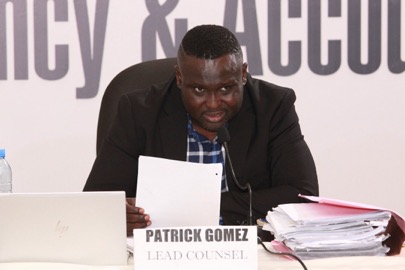
This follows the finance director’s testimony over how KMC’s rates collection supervisors collect arrears from property owners. Keita stated that they would go round to collect the money, bring the cash to the council and then obtain receipts to take back to the property owners.
Appearing before the Commission on Thursday, Keita testified that managers and all staff in the licence unit would go to collect revenue, adding that he had a record of the weekly collection from each unit. The Commission ordered him to provide the register for each of the three revenue lines – rates, license and market.
He disclosed that each cashier had a cash book. For the market unit, the witness said, all collectors and the market masters had a cash book; for the rates unit, before 2024 the collectors in this unit did not handle cash. Instead the rates supervisors handled cash when collecting the arrears, he stated, adding that the property owners used to go to the Council and pay directly. He said that in 2024, all the collectors were issued GTR receipt books and cash books.
Regarding how supervisors collect arrears from property owners, he testified that they would go round and collect the money, bring the cash to the council and obtain receipts which they take back to the property owners. He said that they were without cash books.
Lead Counsel Patrick Gomez directed him to section 903 of the Financial Manual, carrying the caption ‘Subsidiary Cashbook’. It provides that it is the cash book to be used by employees charged with the receipt of revenue, who are required to make lodgement to the main cashier at council headquarters. It records, in serial number of order, the receipts, tickets, licenses, etc., and the amounts received from the public, on the day of receipt.
After reading this provision, the witness said they were using a computerised system. Even though not convincing, Lead Counsel Gomez referred him to section 914 of the manual, which is about computerised accounting system.
“The law said they must maintain a cash book,” Lead Counsel Gomez said. Keita agreed.
The lead counsel added: “If they do not maintain cash books, and they are receiving revenue, will that not be open to fraudulent activities?”
“Of course,” Keita reacted, “anybody handling cash must have a cash book.”




